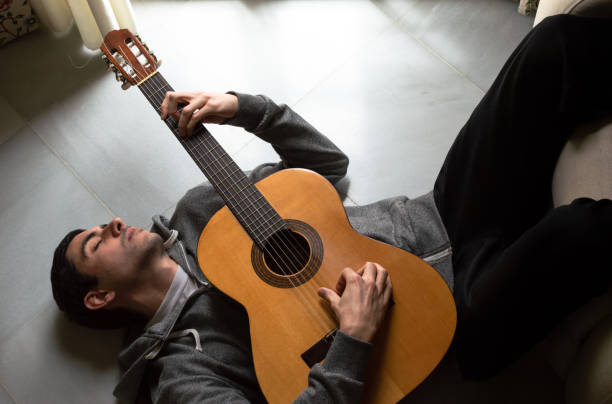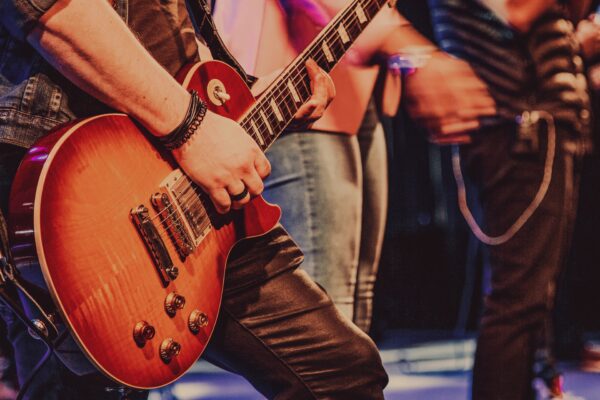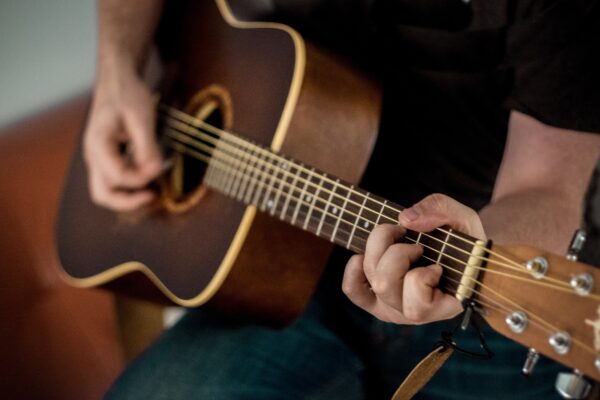Table of Contents
How many times have you heard someone say “I’m so tired, I played guitar for hours today”? Do guitars really take a lot of energy to play? Is playing guitar tiring?
While for some guitar players playing can make them tired, there is more to it.
In this article, we will go over some of the most common reasons why you may feel tired while playing guitar and how you can overcome this.
The science of playing guitar
When you play guitar, you use a lot of muscles. But does that mean it’s tiring? Well, it can be to a certain point. Playing guitar requires a lot of coordination between both hands, and your head.
It is not always easy to keep the right rhythm while playing the right notes. Although it is not a high competition sport, it does make you tired after some time. Especially if you are just starting to learn how to play.
Does playing guitar make you tired?
Playing guitar requires the use of many muscles, including the fingers, hands, and arms.
Different guitar players will experience different levels of fatigue depending on their individual physical conditions and playing style.
Fatigue can also be caused by other factors, such as:
- Foods you are eating
- Sleeping schedule
- Lack of sleep
- Stress level
- Poor nutrition
While playing the guitar can be a physically demanding activity, it all comes down to the energy you use while doing it. If you practice extremely fast, and complicated songs, it can be tiresome, and it can make you very tired.
Despite using a lot of energy, playing guitar is actually good for you. It can help improve your hand-eye coordination, posture, and more.
Does playing guitar make you sleepy?
Playing guitar can also be relaxing, and especially after a long day playing can make you sleepy.
While others find that it energizes them and keeps them awake. This can be extremely energizing for some guitarists and it can make others sleepy.
The effects of playing guitar can vary depending on the person’s mood, temperament, and general physical condition at the time. Generally speaking, however, playing guitar is a relatively calming and relaxing activity, which may lead some people to feel sleepy after a while.
Some people do not have the best practice routine, and this is reflected in feeling sleepy while playing guitar.

How do you not get tired when playing the guitar?
One of the ways to not get tired while playing guitar is to eat well, and sleep well. You should address these things even before considering anything else.
Additionally, you should start organizing your practice in the best way possible. Focusing on specific exercises at a time, and build up your playing during your practice session.
Some guitar players also get tired because they end up repeating the same exercises multiple times, without making any significant progress.
Why it is important to practice correctly
Practicing guitar, especially when you are extremely tired is not always the best thing. You should always practice when you are alert, and you can develop your skills.
Some guitar players will push themselves to practice every day for hours and hours, and while they might get better they are not reaping all of the benefits of practicing.
One of the most important things to improve on the guitar is to have a well-established practice routine that is constantly updated. Here is how you can outline the perfect practice routine:
- Warm-up exercises
- Difficult exercises
- New techniques you are working on
- New songs you are learning
- Hearing training
- Improvisation training
Warm-up exercises
Even before you start practicing complex songs, or solos you should always use a few warm-up exercises. This will allow your fingers and hands to get activated and prevents injuries during your practice routine.
Ideally, you should start with some simpler warm-up exercises to get your fingers and hands warmed up. Then start doing the same exercises faster, until you pick up the pace.
Difficult exercises
Once you have warmed up your fingers and hands, you should start practicing difficult exercises. This often includes playing scales faster, and even a little shredding. It is the perfect time to work on some of the new scales and sounds you have been focusing on.
New techniques you are working on
Once you have warmed up and done some difficult exercises, it is now time to start working on new techniques. This may include a solo with a difficult part that you still need to master.
Repeating them every day until you have mastered them is the best way to learn new techniques.
New songs you are learning
Once you have done all of the hard stuff, it is now time to focus on the new songs you are learning. These can be songs that you are going to play live, or perhaps a song you really want to learn. It is important during this time of the practice that you do something that is not so repetitive and actually brings you some joy.
Hearing training
One important component of every practice routine is to train your hear. This is often disregarded by some guitar players but it is incredibly important. You can start by trying to figure out the chords of a certain song or even transcribe a solo.
It is essential that you focus not only on your ability to play the instrument but also to develop your hearing and other abilities to become a better musician overall.
Improvisation training
Finally, another important step in every practice routine is to give you some time to improvise. Improvising allows you to combine everything you have been learnings. From chords to songs, to licks, and scales.
It is a great way to develop your musical ability, rhythm, and musical feel.
Conclusion
While some guitar players may feel tired when playing, it all comes down to having the right practice routine. This is important because it keeps you motivated, and you know exactly what you need to play in order to progress.
Noodling around the same chords and scales all the time can be boring, and you slowly start losing your interest in playing guitar.
Sometimes you may also play guitar after work or school, and you might be already tired. In this case, it is always better to wake up the next and practice after a refreshing sleep.
So, is playing guitar tiring? In short, no – but it does use a lot of energy!

I have been playing guitar for the past 15 years, and my knowledge and passion for guitars prompted me to start Guitaresque to share my knowledge, tips, and tricks with other guitar players. The sole purpose of this website is to help and inspire guitar players worldwide, to improve their playing and their love for guitars.









